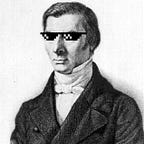Power to the people!
Have you even heard of common law?
You are more likely to be hit by lightning on the way to the polls than for your vote to change an election. Not a single politician has lost their job over the NDAA. Raw milk is illegal for human consumption in eleven states, despite the majority of humanity consuming it throughout history (it can’t be all that bad, and shouldn’t we have the power to put what we want in our own bodies).
It appears that democracy is broken. Citizens have almost no direct influence over policy, and much of what makes it into law has no moral place there. Furthermore, the opinions of the majority of Americans have almost no impact on whether legislation will be adopted.
This ignores the corruption in the execution of the law completely.
We need to rethink how our laws are written. We need a process that directly places power in the hands of citizens, instead of in the hands of corrupt politicians and those who can afford their own lobbyist.
Fortunately, humanity has examples of legal traditions to fall back on that achieve this very thing.
Common law?
We’re all familiar with civil law, wherein a governing body passes legislation to regulate activities in a top-down fashion. Common law is the exact opposite: an organic, bottom-up approach to law in which the people directly influence and decide the legal tradition in which they live.
This system of law is primarily an Anglo one, getting its real start in the 1150’s under Henry II. Probably the only absolute custom in this tradition is that previous rulings are given very heavy weight in following ones. These rulings and traditions make up the legal code. In a pure system, they are the only law.
The advantages of this system, relative to civil law, should be readily apparent. First and foremost, in a pure common law system, defendants will always be able to argue the merit of the case. That is, even if they are guilty, should they be punished?
Food is a surprisingly relevant case study. The FDA and various state agencies have quietly turned what we eat into one of the most regulated aspects of our lives. By what right, though? Shouldn’t consumers be able to make their own decisions about what they eat? If they want to eat completely organic beef slaughtered in a pristine field with a bacterial count an order of magnitude less than typical processed meat, it’s their business.
In a common law system, a defendant would be able to make that exact argument. Under the FDA, individual liberty really never enters the picture.
This is not the only benefit of common law, though. It also disperses the mechanism of control of our laws, thereby making it significantly more difficult for lobbyists to rig the game in their favor. To corrupt a single case, they must run the risk of being discovered and ruining the credibility of any ruling in their favor. However, they must also do this in every subsequent case to continue the tradition. Eventually, word will get out. It simply has to. The NSA can’t even keep its most nefarious and illegal activities from getting leaked.
Under civil law, all a lobbyist has to do is take the relevant head of a committee out to a nice steak dinner a few times, make a four or five figure donation to a super PAC, and presto! The desired legislation gets tagged on to the end of a budget bill, probably completely overlooked by media until it’s too late.
An important corollary to this is that changes in law must be reached by reason, not conniving. You must convince the judge or jury that your case is just and valid. You must convince people in society, prior to trial, of certain attitudes about justice.
There are many other advantages to this system, but in the name of brevity I will leave you with this one: flexibility. Fiat is not flexible, especially in its current form in most societies today. Bureaucracies write thousand and thousands of pages of regulation, and if you fall afoul of even one of them, you can be prosecuted with little recourse. Laws from decades or even centuries make routine appearances in court.
In common law, while tradition weighs heavily on it, each case is allowed to be considered on its own, as well. New situations, technologies, or thoughts can be broached at the exact moment they are relevant. If a very specific set of circumstances needs consideration, it can be done without needing a generalized law casting a shadow over the rest of society.
Common law, in my opinion, is a bedrock institution of a free society. Without it, the people are ruled. With it, the people rule themselves. If we are to see freedom and cooperation multiply in society, at the least, this tradition must be adopted. Bought and paid for politicians are simply unable to resist the inevitable pull of incentive.
